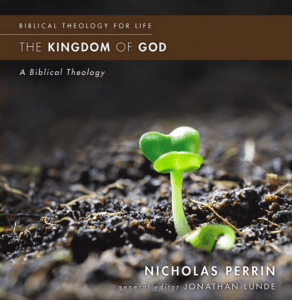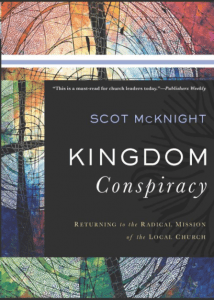A pastor sent me this note about One.Life: Jesus Calls, We Follow and I asked for his permission to post his letter and respond to it here. One.Life makes a case that diverges somewhat from some standard understandings of “kingdom.” He asked about it. Here’s his letter and my response is after the jump. I consider this view of the kingdom to be both the historic view and, at the same time, a view we need to recapture.
I received a copy of your book, “One.Life”. This book was a wonderful gift for me. I read the entire book last week. It was so well written and refreshing in many ways. I love the way you included some of your own story in this, especially at the very beginning. Your love for your students and your ministry at NPU came through in a beautiful way. Great job! I simply want to encourage you to know your work is appreciated by your readers! I read the whole book last week and got home and ordered 10 copies so I could give one to each person on our church staff.
I do have one question that I want to ask if you could either share a few thoughts on yourself or maybe point me to some readings to help me: In your book you obviously focus on the teaching of Jesus on the Kingdom of God in a central way. Your premise is that when Jesus talked about the kingdom of God he meant, and his first listeners would understand this, that the kingdom was more of a global and social vision of God’s dream for the world unfolding – and that this would happen through communities of faith – through the church.
This is a different interpretation than say understanding the kingdom of God as primarily an individual’s person experience with Jesus or their personal spirituality.
So my question is: How is it that you come to this interpretation of The Kingdom of God? When you say….. the Kingdom of God is … “God’s dream for the world come true” (Page #28) or “Kingdom is not about an experience with God but about a society of God.” (page #29) or “By Kingdom Jesus means: God’s Dream Society on earth, spreading out from the land of Israel to encompass the whole world.” – I understand this and it rings true, but I’m asking you if you could help me know a bit more about why you believe this is what the bible is teaching? Expand a bit on your section “THE DREAM: SOCIETY OR PERSONAL SPIRITUALITY” (Page #31-32) How do you come to this interpretation as it is indeed different from the way many have understood and taught about The kingdom of God?
Any thoughts or resources on this question would be appreciated and again – love the book!
Sincerely,
This is a good question and I hope many are challenged to go back to the Bible to rethink how we use “kingdom.”
First, I want to offer a few elements of the view I’m essentially responding to. For some the “kingdom” is the social stuff, the be-good-to-others stuff, the justice stuff while “salvation” is the spiritual and conversion stuff. Another way I hear folks talk about this is this: kingdom is social stuff, it is universal stuff, it is the stuff we do to make the world a better place — in this sense, kingdom is much bigger than the church.
Second, I spent a long long while on this blog examining kingdom texts in the NT and I would refer readers to those posts, boring as they might be to comb through to watch the themes emerge. I went through every NT text about kingdom in that series.
Third, evangelicals often do say exactly what you have said: many of us see “kingdom” as the “personal experience of God’s reign.” In other words, we find in the term “kingdom” our evangelical theology of the need for personal conversion. For such folks, kingdom is little different than the personal experience of salvation. This comes at the term from a modern evangelical angle and almost completely misses the Jewish context. This view of kingdom is hurting the church as much as it is helping because it feeds our individualism.
Fourth, while I can see some conversional dimensions to kingdom in the NT in the “enter the kingdom” sayings, we simply must begin where Jews would have begun: in the Jewish world, the very first connection with the word “kingdom” is “David.” God established the kingdom of David, God cut in half the kingdom of David, God disciplined the kingdom of Israel/Judah, and God promised someday the kingdom of our father David would be restored. When Jesus said, “the kingdom is at hand” in Mark 1:15, the ordinary Jew didn’t say “Wow, I can now get saved” but “Finally, our promises for the Davidic kingdom will be realized.” We must begin here or we get it all wrong.
Fifth, this means that a Jew (and Jesus) would have meant God’s true Society when they said kingdom. Let’s expand this briefly: to say “kingdom” in the 1st Century implies a King (Jesus is that King), a citizenship (Jesus’ followers are those citizens), and a Torah (Jesus’ teachings are the new Torah). One can’t say Kingdom and not think of these things in the Jewish world. Kingdom means God’s messianic society.
Sixth, here’s our problem: we have made “kingdom” so much about personal salvation that we evangelicals have colonized it. Frankly Protestant liberals have colonized it in another way: they’ve made it the Western social liberal democratic agenda. I have no reason to dispute that kingdom has a powerful socially-influential design, but we have made it too much about our personal agendas. We need to go back to see what Jesus meant by kingdom.
Seventh, I have made the suggestion before and I’ll make it again. There is good reason to think that Jesus used “kingdom” for God’s promised society of justice, peace, wisdom and love. I doubt many would dispute this. But I am suggesting that what Jesus called “kingdom” is more or less, sometimes more and sometimes less, than what Paul meant by “church.” I’m fully aware of the Constantinian disaster, of making kingdom/empire the same as church, and in the process wounding church dramatically. But I want to ask us to reconsider a closer connection of kingdom with church, not by equating the two but by seeing kingdom as God’s ideal society where God’s people do God’s will, and seeing church as the (yes) political term Paul chose to describe the embodiment of Jesus’ kingdom vision as he planted such kingdom bodies throughout the Roman empire. One could say the kingdom is the eschatological fullness of what we experience now in the church.
I am then making the suggestion that kingdom is about Jesus, it is about Jesus’ people, and it is about Jesus’ people living Jesus’ teachings. The place where that design is supposed to happen is the local church.
Here’s the problem: church has become so much about religion and personal spirituality that we’ve nearly surrendered the socio-political impact the church is supposed to be as kingdom embodied in this world. I’m asking that we expand our perception of church to kingdom dimensions.












